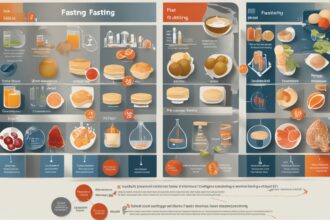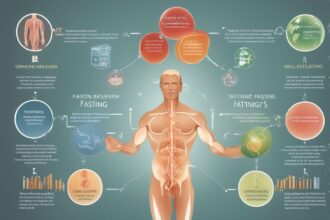Have you ever wondered why some people seem to thrive on fasting while others struggle to get through a single day without food? The answer might lie in your DNA. Fasting, a practice as old as humanity itself, isn’t just about weight loss or detoxing—it’s a powerful tool that can interact with your genetic makeup to influence health, longevity, and even disease prevention. In this deep dive, we’ll explore the fascinating connection between fasting and genetics, unpacking the fasting benefits that go beyond the surface. Whether you’re a seasoned faster or just curious about intermittent fasting advantages, this post will provide scientific insights and actionable tips to help you harness the power of fasting tailored to your unique biology.
What Is Fasting and How Does It Work?
Fasting, at its core, is the voluntary abstinence from food and drink for a specific period. From intermittent fasting (like the 16:8 method, where you fast for 16 hours and eat during an 8-hour window) to prolonged fasts lasting several days, this practice has gained popularity for its numerous health perks. But what’s happening inside your body when you fast? When you stop eating, your body shifts from using glucose as its primary energy source to burning stored fat, a process called ketosis. This metabolic switch doesn’t just help with weight management; it triggers a cascade of cellular and molecular changes that can influence gene expression—yes, fasting can literally “talk” to your DNA (Valter Longo, 2016). These changes are part of why fasting benefits include improved insulin sensitivity, reduced inflammation, and even enhanced brain function.
The Genetic Connection: How Fasting Influences Your DNA
Let’s get into the nitty-gritty: fasting doesn’t just affect your waistline; it impacts your genes through a process called epigenetics. Epigenetics refers to changes in gene expression—how your genes are “turned on” or “off”—without altering the DNA sequence itself. When you fast, your body enters a state of mild stress, which activates certain genes related to repair and survival. For instance, fasting upregulates genes associated with autophagy, a cellular “clean-up” process that removes damaged components and may protect against aging and diseases like cancer (Mattson et al., 2017). Studies also suggest that fasting can influence the expression of sirtuins, a family of proteins linked to longevity and metabolic health (Guarente, 2013). So, the health benefits of fasting aren’t just temporary—they could reprogram how your body functions at a genetic level.
Fasting Benefits Tailored to Genetic Variations
Not everyone responds to fasting the same way, and genetics play a big role in that. Some people have genetic variations that make them more responsive to the fasting benefits like improved insulin sensitivity or fat loss, while others might struggle with hunger or fatigue due to differences in genes regulating metabolism or appetite, such as the FTO gene often linked to obesity risk (Loos & Yeo, 2014). Personalized nutrition and fasting plans are emerging as a way to address this. For example, if you carry certain genetic markers, a shorter fasting window might yield better results than a prolonged fast. Genetic testing services can provide insights into how your body might react to fasting, helping you maximize the intermittent fasting advantages while minimizing discomfort.
Here are a few ways genetic variations can influence fasting outcomes:
- Metabolic Rate: Genes like PPARG can affect how efficiently your body switches to fat-burning during fasting.
- Appetite Control: Variations in the MC4R gene may make fasting feel more challenging due to heightened hunger signals.
- Insulin Response: Genetic markers in TCF7L2 can impact how fasting improves your blood sugar regulation.
- Stress Response: Differences in cortisol-related genes might influence how your body handles the stress of fasting.
Scientific Evidence Behind Fasting and Genetic Health
The science backing the fasting benefits on genetic health is growing. Research shows that fasting can activate pathways like AMPK and mTOR, which regulate cellular energy and growth, directly impacting gene expression tied to aging and disease prevention (de Cabo & Mattson, 2019). For instance, intermittent fasting has been shown to reduce oxidative stress and inflammation—two factors that can damage DNA over time—potentially lowering the risk of chronic conditions like diabetes and heart disease (Patterson et al., 2017). Moreover, fasting-mimicking diets, which replicate the effects of fasting with minimal calorie intake, have demonstrated promising results in promoting stem cell regeneration and improving immune function through genetic mechanisms (Longo & Mattson, 2014). These findings highlight how the health benefits of fasting extend far beyond weight loss, offering a blueprint for long-term wellness at the cellular level.
Practical Tips to Optimize Fasting Based on Your Genetics
Ready to dive into fasting but unsure where to start, especially with your unique genetic profile in mind? While you can’t change your DNA, you can adapt your fasting approach to work with it. The key is to listen to your body and experiment with different fasting protocols to find what suits you best. If genetic testing isn’t accessible, don’t worry—there are still universal strategies to enhance the fasting benefits while minimizing potential downsides. Below are some practical tips to get you started:
- Start Small: If you’re new to fasting or suspect genetic predispositions to intense hunger, begin with a 12:12 schedule (12 hours fasting, 12 hours eating) before progressing to longer windows.
- Stay Hydrated: Dehydration can exacerbate fasting stress, so drink plenty of water, herbal teas, or black coffee to support your body’s genetic repair processes.
- Focus on Nutrient Timing: Break your fast with nutrient-dense foods like lean proteins and healthy fats to support genetic pathways tied to recovery and metabolism.
- Monitor Energy Levels: Pay attention to how fasting affects your mood and energy—genetic differences mean some may need shorter fasts to avoid fatigue.
- Consult Experts: If possible, work with a dietitian or get a genetic test to tailor your fasting plan for optimal intermittent fasting advantages.
Potential Risks and Genetic Considerations
While the health benefits of fasting are impressive, it’s not a one-size-fits-all solution. Genetic predispositions can influence how your body handles fasting stress, and for some, it may even pose risks. For example, individuals with certain genetic conditions like familial hypercholesterolemia might experience adverse lipid changes during prolonged fasts. Others with variations in stress-response genes may feel heightened anxiety or irritability while fasting. It’s crucial to approach fasting with caution if you have a family history of metabolic disorders or eating issues. Always consult a healthcare provider before starting, especially if you’re on medication or have underlying conditions. The goal is to maximize fasting benefits without compromising your well-being, and understanding your genetic blueprint can help strike that balance.
In wrapping up, the interplay between fasting and genetics opens up a world of possibilities for personalized health. The fasting benefits—from cellular repair to improved metabolic health—can be amplified when you align your fasting practice with your genetic profile. While we’re still uncovering the full extent of how our genes interact with fasting, the evidence so far is clear: this ancient practice has modern, science-backed potential to transform your health. So, whether you’re fasting for weight loss, mental clarity, or longevity, take it step by step, listen to your body, and consider exploring your genetic makeup for a truly tailored approach. Here’s to unlocking the hidden power of fasting, one fast at a time!
References
- de Cabo, R., & Mattson, M. P. (2019). Effects of intermittent fasting on health, aging, and disease. New England Journal of Medicine, 381(26), 2541-2551.
- Guarente, L. (2013). Calorie restriction and sirtuins revisited. Genes & Development, 27(19), 2072-2085.
- Longo, V. D. (2016). Fasting, longevity, and healthspan: Past, present, and future. Gerontology, 62(5), 518-526.
- Cell Metabolism, 19(2), 181-192.
- Loos, R. J., & Yeo, G. S. (2014). The bigger picture of FTO: The first GWAS-identified obesity gene. Nature Reviews Endocrinology, 10(1), 51-61.
- Mattson, M. P., Longo, V. D., & Harvie, M. (2017). Impact of intermittent fasting on health and disease processes. Ageing Research Reviews, 39, 46-58.
- Patterson, R. E., Laughlin, G. A., LaCroix, A. Z., et al. (2017). Intermittent fasting and human metabolic health. Journal of the Academy of Nutrition and Dietetics, 115(8), 1203-1212.






